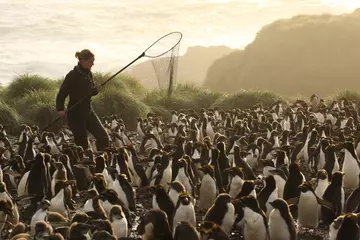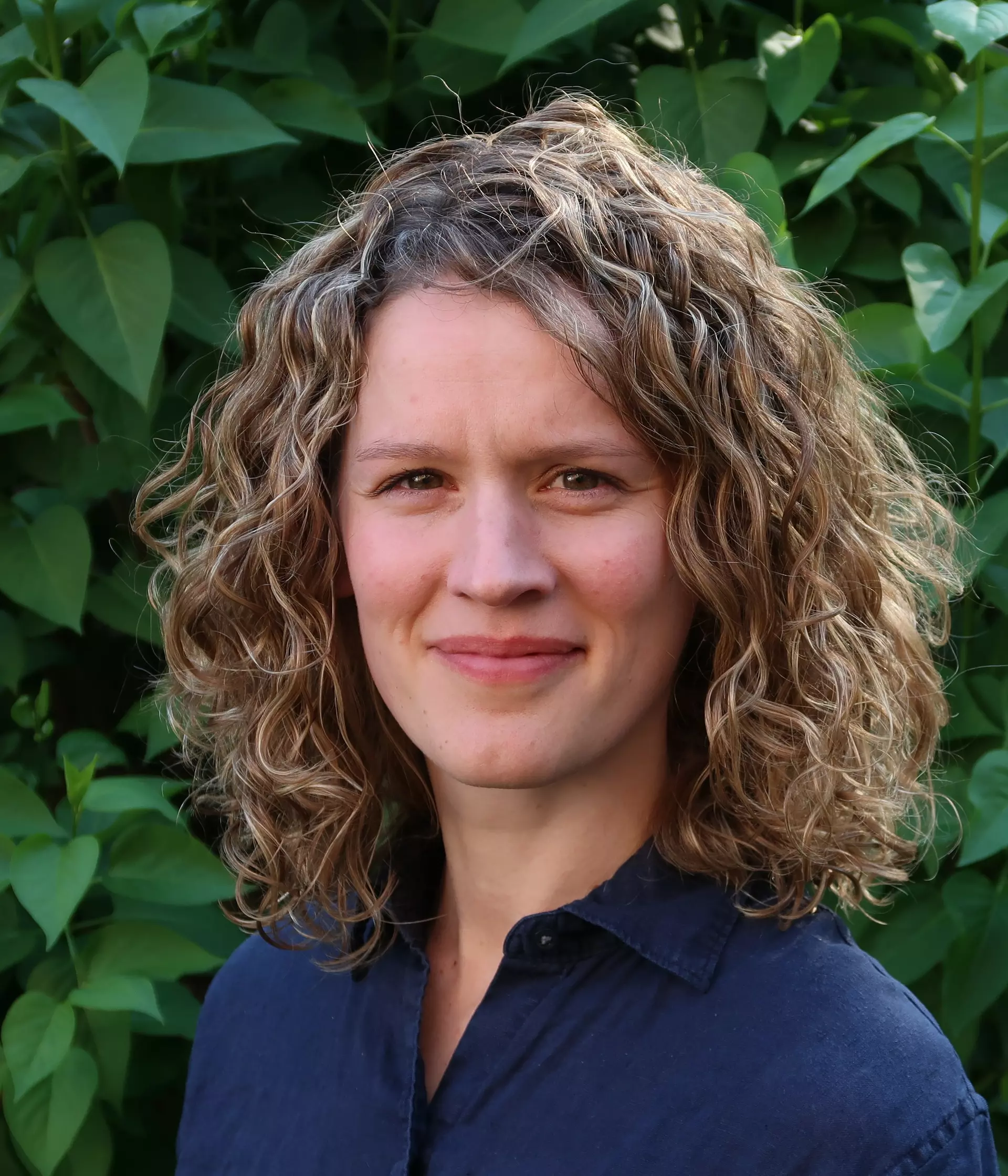
Seabirds
Distribution Modelling
Institute of Zoology
Zoological Society of London
London
NW1 4RY
Catharine Horswill is a marine predator population ecologist with a strong quantitative and applied focus to her research.
Catharine works on bioindicator species, such as seabirds, that can provide direct insights into the health of our oceans. Her work has strong synergies with three IoZ Conservation Challenges: ‘Coexistence of people and wildlife’, ‘Mitigation and adapting to climate change’, and ‘Biology and recovery of small populations’. Within these areas, Catharine answers questions within two primary themes:
Understanding the processes that drive spatial and temporal variation in population change.
Catharine uses advanced statistical approaches to progress our understanding of how bioindicator marine species respond to environmental change and how this varies spatially and through time. To do this, she uses a variety of different data, including demographic, movement, diet, and experimental.- Develop cutting-edge solutions for assessing climate and human impacts on marine predators.
Catharine develops cutting-edge solutions for conducting species and population assessments in data-limited scenarios. This work has directly informed conservation practice, including the management of krill fishing in the Southern Ocean and the development of industry-standard impact assessments for offshore renewable energy developments in the UK.

Contact Cat to discuss PhD and postdoc positions, or Master's research projects
Employment
2020-present: Springboard Fellow; ZSL Institute of Zoology and University College London
2018-2021: Visiting Fellow; University of Cambridge
2016-2020: Post Doctoral Research Associate; University of Glasgow
2014-2016: Research Ecologist; British Trust for Ornithology
Qualifications
2010-2014: PhD Population Ecology; British Antarctic Survey, University of Liverpool and University of Glasgow
2008-2009: MSc Biosciences; University of Oxford
2002-2006: BSc Environmental Sciences with a year in Industry; University of East Anglia
H-index: 13; Total number of citations: 681 (Google Scholar)
Catharine's research has featured on the front of 8 journals issues (7 as lead author):

Lead or co-author author of 26 (14 as lead author, 2 as senior author) published peer-reviewed papers, including 15 that are independent from Catharine's PhD supervisors (8 lead, 2 senior):
Horswill, C., V. Warwick-Evans, N.P.G. Esmonde, N. Reid, K. Davies, H. Kirk, S.A. Josey & M.J. Wood. 2023. Interpopulation differences and temporal synchrony in rates of adult survival between two colonies of a seabird, the Manx shearwater, that differ in population size and distance to foraging grounds. Ecology and Evolution, 13, e10455. DOI: 10.1002/ece3.10455
de Lorm, T. A., C. Horswill, D. Rabaiotti, R. M. Ewers, R. J. Groom, J. Watermeyer & R. Woodroffe. 2023. Optimizing the automated recognition of individual animals to support population monitoring. Ecology and Evolution, 13, e10260. DOI: 10.1002/ece3.10260
Constanti-Crosby, L., F. Sayol & C. Horswill. 2023. Relative brain size is associated with natal dispersal rate and species’ vulnerability to climate change in seabirds. Oikos, 7, e09698. DOI: 10.1111/oik.09698
Nicoll, M.A.C., N. Cole, C. Horswill, C.G. Jones, N. Ratcliffe, K. Ruhomaun, V. Tatayah & K. Norris. 2022. No detectable effect of geolocator deployment on the short- or long-term survival of a tropical seabird. Ibis, 164, 1201-1212. DOI: 0.1111/ibi.13094
Oppel, S., B.L. Clark, M.M. Risi, C. Horswill, S.J. Converse, C.W. Jones, A.M. Osborne, K. Stevens, V. Perold, A.L. Bond, R.M. Wanless, R. Cuthbert, J. Cooper & P.G. Ryan. 2022. Cryptic population decrease due to invasive species predation in a long-lived seabird supports need for eradication. Journal of Applied Ecology, 59, 1947-2208. DOI: 10.1111/1365-2664.14218
Horswill C., M.J. Wood & A. Manica. 2022. Temporal change in the contribution of immigration to population growth in a wild seabird experiencing rapid population decline. Ecography, 2022, e05846. DOI: 10.1111/ecog.05846
Dunn R. E., J. A. Green, S. Wanless, M. P. Harris, M. A. Newell, M.I. Bogdanova, F. Daunt, C. Horswill & J. Matthiopoulos. 2022. Modelling and mapping how common guillemots balance their energy budgets over a full annual cycle. Functional Ecology, 36, 1612-1626. DOI: 10.1111/1365-2435.14059
Horswill C., J.A.O Miller, & M.J. Wood. 2021. Impact assessments of wind farms on seabird populations that overlook existing drivers of demographic change should be treated with caution. Conservation Science and Practice, 4, e12644. DOI: 10.1111/csp2.12644
Wood, M.J., C. Canonne, A. Besnard, S. Lachish, S.M. Fairhurst, M. Liedvogel, D. Boyle, S.C. Patrick, S. Josey, H. Kirk, B. Dean, T. Guilford, R.M. McCleery, C.M. Perrins & C. Horswill. 2021. Demographic profiles and environmental drivers of variation relate to individual breeding state in a long-lived trans-oceanic migratory seabird, the Manx shearwater. PLoS ONE, 16, e0260812. DOI: 10.1371/journal.pone.0260812
Horswill C., A. Manica, F. Daunt, M.A. Newell, S. Wanless, M.J. Wood & J. Matthiopoulos. 2021. Improving assessments of data-limited populations using life-history theory. Journal of Applied Ecology, 58,1225–1236. DOI: 10.1111/1365-2664.13863
Nanninga G.B., C. Horswill, S.M. Lane, A. Manica & M. Briffa. 2020. Microplastic exposure increases predictability of predator avoidance strategies in hermit crabs. Journal of Hazard Materials Letters, 1:100005. DOI: 10.1016/j.hazl.2020.100005
Riley, R.J., E.R. Gilllie, C. Horswill, R.A. Johnstone, N.J. Boogert & A. Manica. 2019. Coping with strangers: how familiarity and active interactions shape group coordination in Corydoras aeneus. Royal Society Open Science, 6, 190587. DOI: 10.1098/rsos.190587
Horswill, C. & A. Manica. California swordfish fishery: Maximizing the catch rate of a target species simultaneously minimizes bycatch rates. 2019. Proceedings of the National Academy of Sciences of the United States of America, 116, 7172-7173. DOI: 10.1073/pnas.1820821116
Horswill, C., N.K. Dulvy, M.J. Juan-Jordá, H.K. Kindsvater, M. Mangel & J. Matthiopoulos. 2019. Global reconstruction of life-history strategies for data-limited populations. Journal of Applied Ecology, 56, 855-865. DOI: 10.1111/1365-2664.13327
Horswill, C., E.M. Humphreys & R.A. Robinson. 2018. When is enough...enough? Effective sampling protocols for estimating the survival rates of seabirds with mark-recapture techniques. Bird Study, 65, 290-298. DOI: 10.1080/00063657.2018.1516191
Kindsvater, H.K., N.K. Dulvy, C. Horswill, M-J Juan-Jordá, M. Mangel & J. Matthiopoulos. 2018. Overcoming the data crisis in biodiversity conservation. Trends in Ecology and Evolution, 33, 676-688. DOI: 10.1016/j.tree.2018.06.004
Horswill, C., J.A. Jackson, R. Medeiros, R.W. Nowell, P.N. Trathan & T.C. O’Connell. 2018. Minimising the limitations of dietary analysis by combining multiple techniques. Ecological Indicators, 94, 218-225. DOI: 10.1016/j.ecolind.2018.06.035
Sherley, R.B., B.J. Barham, P.J. Barham, K.J. Campbell, R.J.M. Crawford, J. Grigg, C. Horswill, A. McInnes, T.L. Morris, L. Pichegru, A. Steinfurth, F. Weller, H. Winker & S.C. Votier. 2018. Bayesian inference reveals positive but subtle effects of experimental fishery closures on marine predator demographics. Proceedings of the Royal Society B: Biological Sciences, 285. DOI: 10.1098/rspb.2017.2443
Horswill, C., P.N. Trathan & N. Ratcliffe. 2017. Linking extreme interannual changes in prey availability to foraging behaviour and breeding investment in a marine predator, the macaroni penguin. PLoS ONE, 12(9): e0184114. DOI: 10.1371/journal.pone.0184114
Horswill, C., S.H. O’Brien & R.A. Robinson. 2017. Density dependence and marine bird populations: are wind farm assessments precautionary? Journal of Applied Ecology, 54, 1406-1414. DOI: 10.1111/1365-2664.12841
Horswill, C., N. Ratcliffe, J.A. Green, R.A. Phillips, P.N. Trathan & J. Matthiopoulos. 2016. Unravelling the relative roles of top-down and bottom-up forces driving population change in an oceanic predator. Ecology, 97, 1919–1928. DOI: 10.1002/ecy.1452
Horswill, C., J. Matthiopoulos, N. Ratcliffe, J.A. Green, P.N. Trathan, R.A.R. McGill, R.A. Phillips & T.C. O’Connell. 2016. Drivers of intrapopulation variation in resource use in a generalist predator, the macaroni penguin. Marine Ecology Progress Series, 548: 233–247. DOI: 10.3354/meps11626
Ratcliffe, N., S.L. Hill, I.J. Staniland, R. Brown, S. Adlard, C. Horswill & P.N. Trathan. 2015. Do krill fisheries compete with macaroni penguins? Spatial overlap in prey consumption and catches during winter. Diversity and Distributions, 21, 1339–1348. DOI: 10.1111/ddi.12366
Horswill, C., J. Matthiopoulos, J.A. Green, M.P. Meredith, J. Forcada, H. Peat, M. Preston, P.N. Trathan & N. Ratcliffe. 2014. Survival in macaroni penguins and the relative importance of different drivers; individual traits, predation pressure and environmental variability. Journal of Animal Ecology, 83, 1057-1067. DOI: 10.1111/1365-2656.12229
Ratcliffe, N., S. Crofts, R. Brown, A. Baylis, S. Adlard, C. Horswill, H. Venables, P. Taylor, P.N. Trathan & I.J. Staniland. 2014. Love thy neighbour or opposites attract? Patterns of spatial segregation and association among crested penguin populations during winter. Journal of Biogeography, 41, 1183-1192. DOI: 10.1111/jbi.12279
Horswill, C., & J.A. Jackson. 2012. Humpback whales wintering at Pitcairn Island, South Pacific. Marine Biodiversity Records, 5, e90. DOI: 10.1017/S1755267212000693
Lead or co-author author of 7 (3 as lead author) commissioned reports and book contributions:
Wilson, M.W., A.S.C.P. Cook, C. Horswill, R.A. Robinson, & C.V. Wernham. 2019. Population modelling for the Scottish Northern raven population. Scottish Natural Heritage Research Report No. 1012.
Jarrett, D., A.S.C.P. Cook, I. Woodward, K.E. Ross, C. Horswill, D. Dadam & E.M. Humphreys. 2018. Short-term behavioural responses of wintering waterbirds to marine activity. Report of work carried out by the British Trust for Ornithology on behalf of Scottish Government. Scottish Marine and Freshwater Science, 9, 88pp. DOI: 10.7489/12096-1
Jarrett, D., A.S.C.P. Cook, I. Woodward, K.E. Ross, C. Horswill, D. Dadam & E.M. Humphreys. 2018. A stochastic collision risk model for seabirds in flight. Scottish Marine and Freshwater Science, 7, 88pp. DOI: 10.7489/12101-1
Thaxter, C.B., C. Horswill, K.E. Ross, G.E. Austin, D.E. Balmer & N.H.K. Burton. 2017. Urban breeding gull surveys: a survey design simulation. BTO Research Report No. 669. British Trust for Ornithology, Thetford.
Horswill, C., R.H. Walker, E.M. Humphreys & R.A. Robinson. 2015. Review of mark-recapture studies on UK seabirds that are run through the BTO’s Retrapping Adults for Survival (RAS) network. JNCC Report No. 600. JNCC, Peterborough.
Horswill, C. & R.A. Robinson. 2015. Review of seabird demographic rates and density dependence. JNCC Report No. 552. JNCC, Peterborough.
Horswill, C. & P.N. Trathan. 2013. Macaroni penguin. World Book Encyclopaedia, Chicago.
